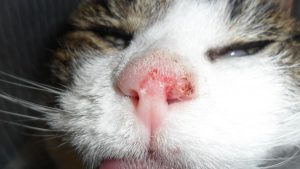
Tigga before her treatment
From The Surrey Comet, UK
Grainne Cuffe, Lead Reporter – Richmond & Twickenham Times and Surrey Comet
An “extraordinary” cancer procedure has eradicated all traces of the disease in its first round of animal patients in Surrey.
North Downs Specialist Referrals (NDSR), a veterinary hospital in Bletchingley, has been using electrochemotherapy, a form of targeted chemotherapy using intense, electrical pulses, in eight animals since the start of November.
One of the animals was a Surbiton couple’s pet cat Tigga.
Tigga, 17, had an itchy and destructive tumour on her nose but after receiving the treatment she was in complete remission within 44 days.
In another case, a tumour vanished in a dog where the aim of the treatment was only to shrink the mass before an operation to remove it.
NDSR is the only referral centre in the UK and one of very few in the world offering the procedure in pets, which is available in a small number of cases on the NHS.
The treatment is given in two stages.
The patient is first given a mild dose of intravenous chemotherapy in the normal way and then, using a special probe, a very precise electrical charge is given to the area on or around the tumour.
The treatment temporarily opens up tiny holes in the cells, big enough to allow the drug to enter, which close again in microseconds.
Unlike normal chemotherapy, which also kills healthy cells, this method means the drugs will only attack cancerous cells.
In the case of Tigga, her owners Paul Carter and Clare Woodley, of Surbiton, Greater London, said the poorly feline had to permanently wear a “cone of shame” to stop her scratching her nose, before the extent of her illness was discovered.
Mr Carter said: “Our regular vets tried various steroid creams to try and bring it down.
“Just as it was almost healing, she would scratch it and it would flare up again.
“She had to wear a cone to stop her scratching and it was affecting her quality of life.

Tigga after her treatment
“Since the treatment it is like she has a new nose. After three weeks she was back to her old self and since then she is just getting better and better.
“As it stands, she has made a complete recovery and there is no sign of the tumour returning.
“We’re extremely grateful to North Downs for the first-class care they provided. Thanks to them we’ve got the old Tigga back.”
Gerry Polton, clinical director of oncology at NDSR, said there are parallels between treating animals and humans for cancer and the results of the electrochemotherapy treatment at NDSR, particularly in dogs, could inform future treatment in humans.
Dr Polton said: “Normal chemotherapy works on the principle of being more damaging to cancer than non-cancerous tissue.
“Some cancers are more resilient, so there are differences in how they respond to treatment, and this can cause more harm to the patient.








